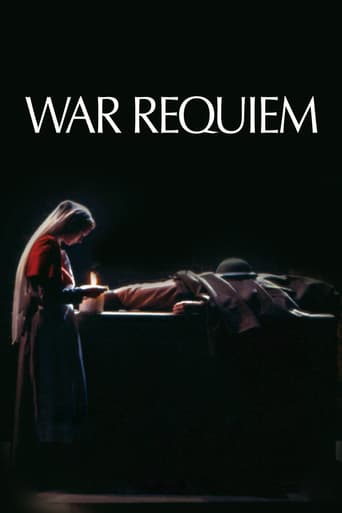



That was an excellent one.
Dreadfully Boring
I am only giving this movie a 1 for the great cast, though I can't imagine what any of them were thinking. This movie was horrible
View MoreThrough painfully honest and emotional moments, the movie becomes irresistibly relatable
View MoreDerek Jarman was the infant terrible of British cinema in the 1970s with his provocative films Jubilee and Sebastiane, the latter having a costume budget of £20!In the 1980s thanks to funding from Channel Four Films he flourished by making low budget films of varying quality in rapid succession. By this time he was getting more accepted by critics and some elements of the public but by now he was also diagnosed as HIV+.War Requiem was partly funded by the BBC, a collaboration of music of Benjamin Britten (War Requiem) with images of war and conflict. Some of the scenes are recreated and dramatised whereas other scenes have been obtained from the Imperial War Museum. There is also poetry of Wilfrid Owen who is depicted in this film by the actor Nathaniel Parker.The film also has Tilda Swinton and Laurence Olivier in the opening scenes. In a sense looking at it now it is the passing of the torch from one acting generation to the next. This was Olivier's final film and it was with a future Oscar winner Swinton.The film was to have no dialogue but once Olivier agreed to play the 'Old Soldier,' Jarman realised that he might as well give the legend some dialogue and he recites a poem by Wilfred Owen.How successful the film is depends on your mileage as to whether you are a Jarman fan, like Opera or appreciate art-house cinema. The dramatised scenes are interesting but not wholly successful but they are beautifully lit and demonstrates what Jarman can do on a low budget. It helps that along with Swinton, Parker we have a young Sean Bean playing a German soldier.However the inclusion of the old documentary footage is less successful as it just makes the film drag. You feel that you are just watching old film with music and some of it is not very interesting although Jarman did also include footage of modern wars as well such as Vietnam, Falklands and the Afghan war with Russia of the 1980s.Still War Requiem is challenging, provocative, arty and displays the talents of a unique voice in British cinema.
View MoreI was watching War Requiem which is Derek Jarman's conception of images of the music of Benjamin Britten and the poetry of Wilfrid Owen and I thought this was a work better left to the imagination. Beautiful, but something I might imagine hearing it would be a lot different.Newsreel footage of World War I and more contemporary conflicts are mixed in with live pantomime like performances of various players and singers including Laurence Olivier in his farewell performance. Olivier plays a wheelchair bound veteran of World War I in whose eyes all the images are seen. Benjamin Britten's War Requiem was originally composed for the dedication of the new cathedral in Coventry, the old one as well as the town itself pretty much blasted to smithereens by Hitler's Luftwaffe. The words are by Wilfrid Owen, the various verses he wrote are put to Britten's music. Owen was killed almost exactly a week before the Armistice was signed in 1918. Oddly enough both men were as one British friend of mine puts it, 'as gay as green shoes'.This is Jarman's vision, not necessarily mine, not necessarily your's. I think that art like this is best left to the individual imagination. But Jarman does a vision of terrible beauty as W.B. Yeats put it.
View MoreWith the exception of an opening sequence in which the music is introduced over a tolling bell and the text of Wilfred Owen's Strange Meeting read, this film follows the scheme of Britten's War Requiem, a poetry-expanded musical setting of the Requiem Mass. It's an intermittently effective project, Jarman using both narrative scenes and more abstracted tableaux that rely on the actor in frame to channel some sort of internal narrative. There is also scattered use of period footage from conflicts both pre-1963 (the date of the oratorio's composition) and as recently as the Falklands conflict (1981). All this is, in turn, the extrapolated daydream of a veteran of the Great War, played by Lawrence Olivier. Olivier's is the almost the only scene done on location and really does carry weight for all that it's mere seconds of screen time. Other scenes are rather more mixed: given the huge emotional and indeed satirical charge of the music the most affecting set pieces are those that play a straight narrative. That said, there is undeniable charge in the formal composition of static shots which reflect in their old master/biblical referencing the liturgy of the text. 5/10
View MoreJarman to a T: Brilliant, atmospheric, imagistic, eccentric, and sometimes homo-erotic. An incredible blend of one of the great 20th century musical works on (or rather against) war and the cinematographic art. I've seen this film twice now. Some of the comments given by other reviewers seem to miss the point of the film- it is dark and sometimes jarring. Jarman uses historic footage, color and colorization as a technique to refocus the viewer's eyes and thoughts. Jarman is not interested in narrative so much as building a series of images that take the poem and music to a new place of understanding.Perhaps this film is not for everyone- but then I would love to tie every politician to his or her chair and force its viewing.
View More